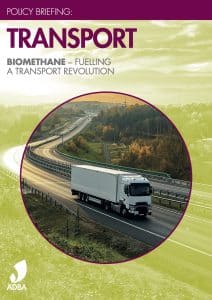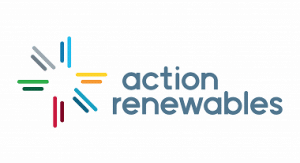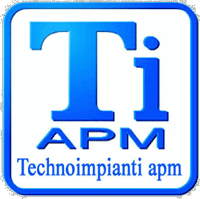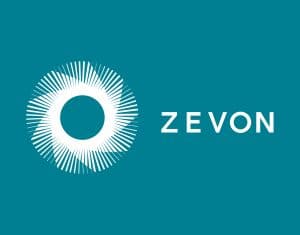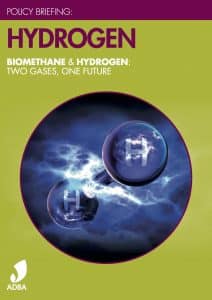ADBA Policy Briefings & Events Series
Start date: 2021-06-09 00:00:00
End date: 2021-11-30 00:00:00
As part of our ongoing responsibility to enable the biogas and anaerobic digestion industry to realise its full potential, ADBA is launching an ongoing series of sector-focused policy briefings & events:
ADBA’s Policy Briefings & Events series will be campaigning ‘how to’ development guides, packed with practical case studies. The Policy Briefings will:
- Take AD’s compelling stories to a wider audience.
- Be a development tool for investors and operators, and
- Act as a practical guide to adoption and deployment.
Each Briefing in the series will focus on a single topic, where the latest data driven market analysis and environmental impact assessments will be presented in an accessible graphic format, supported by dispatches from the front line – case studies from those actively engaged in developing the sector.
In this way the briefings will serve as both campaigning tools to educate third party audiences and support ADBA’s lobbying, and practical guides to operators and investors on the sector’s market potential. The 2021 series will include:
Transport: Biomethane – fuelling a transport revolution
This event has passed. You can get the recordings and presentation slides here
Speakers:
Philip Fjeld, CEO, CNG Fuels (Chair)
David Hurren, CEO, Air Liquide
Gary Mason, Engineering Director, Nottingham City Transport
Marco Amantia, CEO, TECHNOIMPIANTI A.P.M. S.A.S.
Overview:
Pollution levels exceed WHO guidelines on 97% of the UK’s roads. Greenhouse gas emissions from transport has not changed over the past decade. Government is consulting on whether to ban diesel HGV from 2030. Scores of local authorities are introducing Clean Air Zone charging. The smart money is moving to biomethane across public transport, long-haul logistics and food distribution, and – with the launch of the CNHi Biomethane tractor and small scale on-site methanation units – agriculture. The market potential is massive.
In this briefing we:
- Crunch the numbers – analysing the data on engine performance; ROI; emissions – clean air and climate; well-to-wheel impacts; cost-competitiveness and much more.
- Look at the available routes to biomethane expansion, including RTFO and ‘island’ deployment for on-site fuelling,
- And through case studies share first-hand experience from those actively engaged across the supply chain in the biomethane revolution – producers, operators, refuelling stations, HGV and bus manufacturers and operators.
- PLUS – a map of biomethane refuelling stations across the UK and a map of biomethane refuelling stations across mainland Europe.
Agenda:
10:00 – 10:15 Welcome and introduction to ADBA’s transport report
Panel presentations and discussion:
- Answering the key question – why use biomethane to fuel vehicles?
- Presenting the evidence demonstrating how a switch to biomethane can save you money, while saving the planet
- And how virtual pipelines can open up the transport fuel market to remote AD
10:15 – 10:25 Philip Fjeld, CEO of CNG Fuels (chairing the panel)
10:25 – 10:40 Gary Mason, Engineering Director of Nottingham City Transport
+ Q&A for Gary Mason
10:40 – 10:50 David Hurren, CEO of Air Liquide
10:50 – 11:00 Marco Amantia, CEO, TECHNOIMPIANTI A.P.M. S.A.S.
11:00 – 11:30 Q&A with full panel
11:30 – 12:30 Networking
Access to the recordings and presentation slides can be found here here
Interested in sponsorship or advertising? Please contact our sales team to discuss any of the opportunities available: Maddie Hopper at Maddie.hopper@adbioresources.org
Sponsors:
Media Partners:
Register for this FREE event here
Hydrogen: Biomethane & Hydrogen: Two gases, one future
- Overview: Biomethane and hydrogen are highly compatible sources of energy – each may be converted to the other using existing technology. Different energy pathways offer important benefits to the UK’s energy network, from reducing the carbon intensity of the grid to balancing the network. If the gas grid does become 100% hydrogen, biomethane can be used to produce carbon negative green hydrogen (particularly if integrated with CCS (Carbon Capture and Storage)). Considering the UK’s hydrogen industry is in its infancy, there is an opportunity for it to scale up alongside other renewable energies, including AD, wind and solar, to facilitate the transition to and long-term delivery of a net zero energy network.
In this briefing we:
- Crunch the numbers – Map energy pathways with efficiency losses at each stage – biomethane potential with/without P2G & green hydrogen potential; decarbonisation potential; cost of energy comparison and much more.
- Look at the available routes to integrate biomethane and hydrogen – Accounting for carbon (applying carbon price to the various energy outcomes) / rewards through RTFO / exploring scales required and AD’s role in energy and industrial clusters.
- And through case studies share first-hand experience from those starting to produce blue/green hydrogen (worldwide), and innovative trials integrating hydrogen and AD systems (worldwide).
- PLUS – A combined map of AD plants, wind/solar and planned hydrogen production centres to identify potential locations to begin to explore technology integration.
Please note: This pamphlet will be first issued as part of a special global outlook to be included in the World Biogas Summit 2021 programme. The programme will also be distributed as a supplement in the next edition of AD & Bioresources News, out June 11th.
Media Partners:
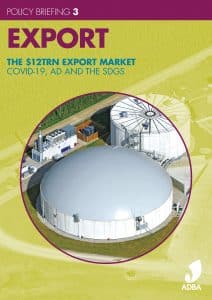
Export: Enlightened self-interest: Covid-19, AD & the SDGs
September, 2021
- Overview: The world pledged to deliver on the UN’s Sustainable Development Goals (SDGs) by 2030. The covid pandemic has given us a small forestates of what can be expected should we fail in that mission. According to the Better Business Better World by the Business & Sustainable Development Commission, achieving the Global Goals could open up an estimated US$12 trillion in market opportunities in four economic systems: food and agriculture, cities, energy and materials, and health and well-being. They represent around 60 percent of the real economy and are critical to delivering the SDGs. AD directly delivers 9 of the 17 SDGs and sits at the heart of those emerging economies.
In this briefing we:
- Crunch the numbers – analysing AD potential, micro to macro; health and environmental impacts; modelling multi-agency responses; investment leverage ratios.
- Look at the available routes to biomethane expansion – MDBs; UN funding streams and toolkits; reputation building through CSR/ESG; aid / trade partnerships.
- And through case studies share first-hand experience of multi-stakeholder partnerships, involving local and national authorities, civil society and the private sector; sustainable investment blueprints; transformative supply chain initiatives.
Media Partners:
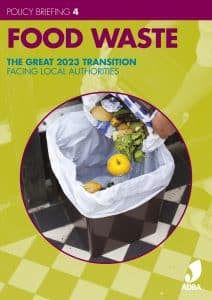
Food Waste: The great 2023 transition facing local authorities
November, 2021
- Overview: From 2023 local authorities in England will be required to have separate food waste collections. The government aims to introduce a ban on food waste going to landfill by 2030. After first making every effort to avoid food waste, AD is the preferred treatment. In 2018, 7.6Mt of food waste unnecessarily went to disposal routes lower down in the waste hierarchy according to WRAP. Currently 50% of local authorities do not have separate food waste collections. With little over a year to act, this briefing considers the best available options open to local authorities.
In this briefing we:
- Crunch the numbers– analysing the data on food waste arising / available industry capacity / capture rates / operational costs / energy potential and end uses / GHG (Greenhouse Gas) savings.
- Demonstrate the value of food waste as a resource in a local circular economy – consider systemic options, Dry- and Wet-AD / AD capacity availability and development / recovery logistics / heat and transport integration.
- And through case studies share first-hand experience – of best practice in the deployment of AD, both wet and dry; the most effective public engagement campaigns and collection rates; blueprints to make waste management cost savings.
- PLUS – a map of AD capacity
Interested in sponsorship or advertising? Please contact our sales team to discuss any of the opportunities available: Maddie Hopper at Maddie.hopper@adbioresources.org


